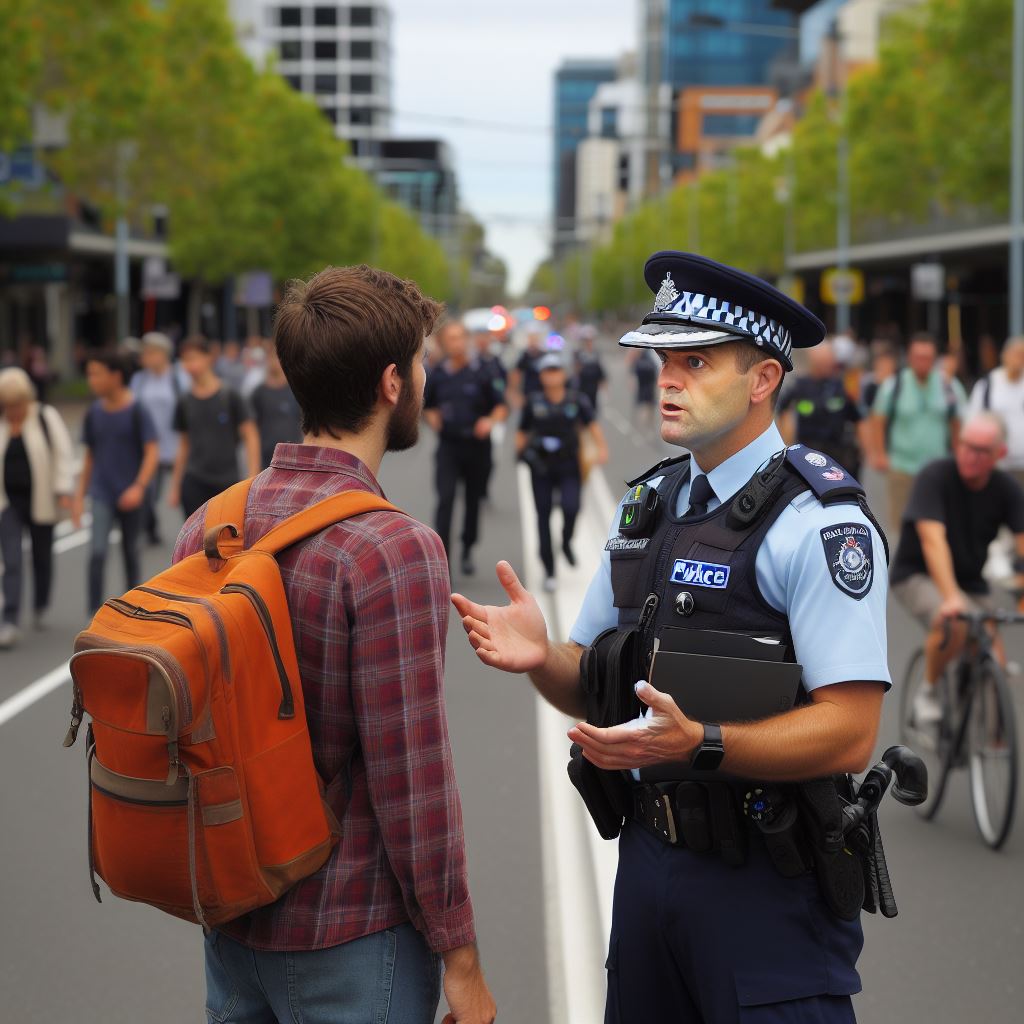Introduction
Police officers’ mental health support is a crucial topic that needs attention. Prioritizing mental health in the police force is essential for overall well-being.
This blog post will discuss the importance of mental health support for police officers and outline key points to be covered.
Law enforcement professionals face unique challenges, often sacrificing their own well-being to protect others.
However, the mental health of police officers is frequently overlooked. It is crucial that we address this issue to ensure their overall well-being.
Mental health support for police officers should be a top priority, as their job places them in high-stress situations regularly.
The nature of their work exposes them to traumatic incidents, increasing their risk of developing mental health issues such as post-traumatic stress disorder (PTSD), anxiety, and depression.
Neglecting their mental health can lead to severe consequences, affecting their job performance and personal lives.
In this blog post, we will delve into the various aspects of mental health support for police officers.
We will explore the importance of training officers to recognize and manage their own mental health struggles.
This includes providing them with tools to cope with stress, promoting self-care practices, and educating them about available resources.
Moreover, we will discuss the significance of creating a supportive environment within police departments.
Establishing policies that encourage openness, destigmatize seeking help, and ensure confidentiality is vital to break down barriers preventing officers from seeking the assistance they need.
Lastly, we will examine the role of peer support programs, counseling services, and access to mental health professionals.
Offering confidential resources specifically tailored to the unique experiences of police officers can provide them with the professional help they require.
By addressing and prioritizing mental health in the police force, we can support our officers in maintaining healthy and fulfilling lives both professionally and personally.
Together, let us advocate for improved mental health support for those who dedicate their lives to protect and serve our communities.
The Challenges Faced by Police Officers
- Inherent stress and trauma associated with police work
- Long working hours, irregular shifts, and constant exposure to potential danger
- Psychological impact of dealing with violence, crime scenes, and distressed individuals
Police officers play a crucial role in society by ensuring our safety and maintaining law and order. However, their job comes with significant challenges that can take a toll on their mental health.
Understanding and addressing these challenges are essential to providing adequate mental health support to our police force.
Inherent Stress and Trauma Associated with Police Work
Police work inherently involves dealing with high-stress situations and traumatic events on a regular basis.
Officers are exposed to violence, accidents, and human suffering, which can have a profound impact on their mental well-being.
These experiences often lead to symptoms of post-traumatic stress disorder (PTSD), anxiety, depression, and other mental health issues.
The constant pressure of being on the front line, facing potential danger, and making split-second life-or-death decisions can have long-lasting effects.
Police officers often find themselves in tense and volatile situations where their safety and the safety of others are at stake.
This constant stress can lead to physical and psychological exhaustion, contributing to mental health challenges.
Long Working Hours, Irregular Shifts, and Constant Exposure to Potential Danger
Police officers are known for working long and irregular hours, often in demanding conditions.
Their schedules may involve overnight shifts, holidays, and weekends, which can disrupt their sleep patterns and social lives.
The irregular work patterns make it difficult for officers to establish regular routines and can negatively impact their overall well-being.
Furthermore, police officers are constantly exposed to potential danger.
They must always be vigilant and prepared to handle any situation that may arise.
This constant exposure to danger can lead to high levels of anxiety and hyperarousal, further exacerbating the mental health challenges faced by police officers.
Psychological Impact of Dealing with Violence, Crime Scenes, and Distressed Individuals
Dealing with violence, crime scenes, and distressed individuals takes a significant toll on the mental health of police officers.
They often witness horrific incidents and are required to intervene in difficult and emotionally charged situations.
The emotional burden of repeatedly witnessing trauma and suffering can lead to compassion fatigue, emotional exhaustion, and a heightened sense of vulnerability.
Engaging with distressed individuals, such as victims or suspects, adds another layer of complexity to police work.
Officers must navigate potentially confrontational interactions, often dealing with individuals who may be experiencing mental health crises themselves.
This constant exposure to human distress and suffering can lead to feelings of helplessness, guilt, and emotional instability.
In a nutshell, police officers face numerous challenges that can negatively impact their mental health.
The inherent stress and trauma, long working hours, irregular shifts, and constant exposure to potential danger take a toll on their overall well-being.
Addressing these challenges and providing adequate mental health support is crucial to ensuring the well-being of our police force and enabling them to serve and protect our communities effectively.
Read: Diplomatic Immunity: The Basics
The Need for Mental Health Support in Policing
Detrimental effects of unaddressed mental health issues among police officers
- High levels of stress and psychological trauma can lead to impaired job performance.
- Untreated mental health issues can affect officers’ decision-making abilities and judgment.
- Increased risk of developing substance abuse problems as a coping mechanism.
- Unaddressed mental health issues can also strain relationships with family and friends.
- Can contribute to a negative work culture and impact teamwork and collaboration.
How untreated mental health conditions can lead to burnout, anxiety, depression, and even suicide
- Continuous exposure to traumatic events can result in chronic stress and ultimately lead to burnout.
- Untreated anxiety can interfere with an officer’s ability to concentrate and make split-second decisions.
- Depression can impact an officer’s motivation, energy levels, and overall mental well-being.
- The stigma surrounding mental health issues may discourage officers from seeking help, exacerbating the situation.
- If left untreated, mental health conditions can escalate and potentially lead to thoughts of suicide.
The importance of proactive measures to support officers’ mental well-being
- Implementing regular mental health check-ins for officers to identify and address any issues early on.
- Providing access to confidential and specialized mental health services that are tailored to officers’ needs.
- Establishing peer support programs where officers can share their experiences and seek advice and guidance.
- Promoting a culture that encourages help-seeking behavior and eliminates the stigma associated with mental health.
- Incorporating mental health training into the initial and ongoing training programs for police officers.
- Ensuring that supervisors are trained to recognize signs of mental health distress and provide appropriate support.
- Offering a range of wellness initiatives such as exercise programs, mindfulness training, and stress management techniques.
- Creating a supportive work environment that fosters a sense of belonging and community among officers.
- Regularly evaluating and revising mental health support strategies based on feedback from officers.
- Advocating for research and policies that prioritize mental health support within the policing profession.
By recognizing and addressing the mental health needs of police officers, we can mitigate the detrimental effects of unaddressed mental health issues, improve overall well-being, and enhance the effectiveness of our law enforcement agencies.
Read: Crisis Management in Diplomacy
Current Mental Health Support Systems in Policing
Overview of Existing Mental Health Support Programs within Police Departments
- Peer Support Programs: Many police departments have established peer support programs to provide emotional guidance and assistance to officers.
- Critical Incident Stress Debriefing (CISD): CISD is a structured group intervention that helps officers cope with traumatic events they may encounter in their line of duty.
- Employee Assistance Programs (EAPs): EAPs offer confidential counseling and therapy services to police officers and their families.
- Wellness Programs: Some police departments have implemented wellness programs to promote mental and physical well-being among officers.
- Crisis Hotlines: Dedicated hotlines are available specifically for police officers to seek immediate help during times of crisis.
Role of Employee Assistance Programs (EAPs) in Providing Counseling and Therapy Services
Police departments recognize the importance of addressing the mental health needs of their officers.
Employee Assistance Programs (EAPs) play a vital role in providing counseling and therapy services.
EAPs offer a variety of support, including:
- Confidentiality: EAPs ensure that officers feel safe and comfortable seeking help without fear of judgment or negative consequences.
- Assessments and Referrals: EAP professionals conduct assessments and refer officers to appropriate mental health resources based on individual needs.
- Short-term Counseling: EAPs provide short-term counseling to officers dealing with personal or work-related challenges.
- Crisis Intervention: EAPs respond to immediate crises, such as officer-involved shootings, by providing critical support and guidance.
- Work-Life Balance Programs: EAPs assist officers in managing work-related stress and achieving a healthy work-life balance.
Specialized Training Provided to Officers on Stress Management and Mental Health Awareness
Police departments recognize the significance of equipping officers with the necessary skills to manage stress and enhance mental health awareness.
Various specialized training programs have been implemented to address these needs, including:
- Stress Management Techniques: Officers receive training in stress reduction techniques such as deep breathing exercises, meditation, and mindfulness.
- Emotional Resilience Training: This training focuses on building emotional resilience to help officers cope with the challenges and traumas they witness.
- Trauma-Informed Approach: Officers are trained in recognizing and responding to individuals affected by trauma, ensuring compassionate and appropriate interventions.
- Mental Health First Aid: Officers learn how to identify the signs of mental health issues and provide initial support until professional help is available.
- Peer Support Training: Officers undergo training to become peer support specialists, allowing them to provide emotional guidance and assistance to their colleagues.
In essence, police departments have recognized the importance of mental health support for their officers.
Existing programs, such as peer support, CISD, EAPs, and specialized training, aim to address the unique challenges officers face.
Continual development and improvement of these support systems are crucial to ensuring the well-being of our dedicated law enforcement professionals.
Your Personalized Career Strategy
Unlock your potential with tailored career consulting. Get clear, actionable steps designed for your success. Start now!
Get StartedRead: Day in the Life of an Aussie Police Officer

The Importance of Peer Support Programs
Peer support programs play a crucial role in promoting the mental well-being of police officers. These programs offer numerous benefits that contribute to the overall mental health of officers.
Benefits of Peer Support in Promoting Mental Well-being among Police Officers
- Emotional Understanding: Peers can relate to the challenges officers face, creating a sense of empathy.
- Non-judgmental Environment: Officers can freely express their emotions without fear of criticism.
- Shared Experiences: Peers have firsthand knowledge of the stressors and traumas, fostering understanding.
- Confidentiality: Trust is built, allowing officers to seek help without compromising their professional reputation.
- Reduced Stigma: Peer support programs change perceptions of mental health, encouraging proactive care.
One key benefit is emotional understanding.
Peers who have experienced similar challenges and traumas can empathize with one another, creating a support network where officers feel understood and validated.
A non-judgmental environment is essential for officers to freely express their emotions without fear of criticism or negative consequences.
Peer support programs provide a safe space where officers can discuss their concerns and seek guidance without compromising their professional reputation.
Shared experiences also foster understanding and validation among police officers.
Peers can relate to the stressors and traumas officers face daily, leading to a sense of camaraderie and unity.
Confidentiality is a fundamental aspect of peer support programs.
Building trust is crucial to ensure officers feel comfortable seeking help without the fear of confidentiality breaches.
This environment reduces the stigma around seeking support for mental health issues.
Role of Peer Support Programs in Fostering a Supportive Work Environment
- Strengthening Connections: Peers build strong relationships, creating a sense of camaraderie.
- Enhanced Officer Performance: Supportive interactions improve job satisfaction and overall performance.
- Conflict Resolution: Peers can mediate conflicts, preventing escalation and improving team dynamics.
- Reduced Burnout: Supportive networks mitigate burnout and decrease the risk of mental health issues.
- Increased Retention: Positive work environment through peer support programs boosts officer retention rates.
Peer support programs play a vital role in fostering a supportive work environment. Strengthening connections among colleagues improves overall job satisfaction and promotes a sense of belonging.
Supportive interactions within these programs can enhance officer performance and productivity. Positive relationships between peers create a support system that encourages professional growth and boosts morale.
Peer support programs can also help resolve conflicts within police departments. Peers who mediate conflicts can prevent issues from escalating, contributing to more harmonious team dynamics.
Burnout is a prevalent issue among police officers. Peer support networks provide emotional support and resources that mitigate burnout, reducing the risk of mental health issues.
Officers who experience a supportive work environment through peer support programs are more likely to remain in the profession.
This increased retention has long-term benefits for both individual officers and the police department as a whole.
Success Stories and Testimonials from Officers Benefiting from Peer Support
- Officer Martinez: After attending peer support sessions, Martinez learned effective coping mechanisms for stress.
- Sergeant Anderson: Peer support helped Anderson overcome post-traumatic stress disorder and regain confidence.
- Detective Johnson: Johnson found solace in peer support, which prevented work-related issues from affecting personal life.
- Officer Rodriguez: Through peer support, Rodriguez developed resilience, allowing him to thrive in a high-pressure environment.
- Lieutenant Thompson: Thompson credits peer support for his successful return to duty and improved mental well-being.
There are numerous success stories and testimonials from officers who have directly benefited from peer support.
Officer Martinez, for example, learned effective coping mechanisms for stress that have positively impacted their work and personal life.
Sergeant Anderson overcame post-traumatic stress disorder with the help of peer support, allowing them to regain confidence and excel in their duties once again.
Detective Johnson found solace in peer support, preventing work-related issues from affecting their personal life and well-being.
Officer Rodriguez developed resilience through peer support, enabling them to thrive in a high-pressure environment and continue serving effectively.
Stand Out with a Resume That Gets Results
Your career is worth more than a generic template. Let us craft a resume and cover letter that showcase your unique strengths and help you secure that dream job.
Get HiredLieutenant Thompson’s successful return to duty and improved mental well-being is credited to the support received through peer support programs.
In fact, peer support programs have undeniable importance in promoting the mental health and well-being of police officers.
These programs offer benefits such as emotional understanding, a non-judgmental environment, and shared experiences.
They also play a significant role in fostering a supportive work environment, resolving conflicts, reducing burnout, and increasing officer retention rates.
The success stories and testimonials from officers prove the positive impact of these programs on their mental well-being and overall job performance.
Read: How to Become a Police Officer in Australia
The Need for Policy Changes and Institutional Support
Importance of creating policies that prioritize mental health within police departments
- Policies that prioritize mental health within police departments are crucial for the overall well-being of officers.
- Such policies acknowledge the unique challenges and stressors faced by police officers in their line of duty.
- Creating a framework that recognizes and supports officers’ mental health needs can contribute to their overall job satisfaction.
- When mental health is prioritized, it reduces the stigma associated with seeking help and encourages early intervention.
- These policies can help reduce the risk of mental health-related issues such as burnout, depression, and post-traumatic stress disorder (PTSD).
- Prioritizing mental health also improves the effectiveness of officers, as they are better equipped to handle stressful situations.
Role of police leadership in addressing mental health concerns and fostering a supportive culture
- Police leadership plays a pivotal role in normalizing conversations about mental health within the department.
- When leaders openly address mental health concerns, it creates a safe space for officers to seek help without fear of judgment.
- Leaders should promote a supportive culture by encouraging officers to prioritize self-care and seek mental health resources.
- They should lead by example and openly engage in discussions about mental health, demonstrating that it is a priority.
- Training programs for police leadership should include modules on recognizing signs of mental distress and providing appropriate support.
- By fostering a supportive culture, police leaders can actively contribute to reducing the stigma surrounding mental health.
Strategies for creating an environment that promotes open discussions about mental health
- Establish confidential mental health support programs tailored specifically for police officers.
- Provide regular mental health check-ins to identify early signs of distress and offer necessary interventions.
- Offer a variety of resources such as access to psychologists, therapists, and peer support groups.
- Train officers on emotional well-being, stress management, and resilience-building techniques.
- Create a peer support network where officers can openly discuss mental health concerns amongst their colleagues.
- Collaborate with mental health professionals to develop specialized programs addressing the unique needs of police officers.
- Implement anonymous reporting systems to encourage reporting of mental health concerns without fear of retaliation.
- Regularly evaluate and update mental health policies and resources based on feedback from officers and mental health experts.
- Establish partnerships with local mental health organizations to ensure a comprehensive support system for officers.
In general, prioritizing mental health within police departments is imperative. Creating policies, fostering supportive cultures, and implementing targeted strategies are vital steps toward ensuring officers receive the mental health support they need.
By valuing the mental well-being of police officers, departments can enhance overall job satisfaction, reduce the risk of mental health-related issues, and ultimately contribute to more effective law enforcement.
Promoting Mental Health Awareness in the Police Force
The Need for Mental Health Awareness Campaigns
Police officers face immense pressure and stress in their line of work, which can greatly affect their mental health. It is crucial to create awareness campaigns targeted at officers and their families to address their unique challenges.
Law enforcement agencies must prioritize the mental well-being of their officers, recognizing that their mental health is vital for their overall performance and the safety of the community they serve.
By implementing mental health awareness campaigns, officers can gain a better understanding of the importance of seeking help for mental health struggles, dispelling the notion that it is a sign of weakness.
These campaigns should also focus on educating the families of police officers about the effects of stress and trauma, enabling them to provide the necessary support and understanding.
The Impact of Stigma and Normalizing Conversations
Stigma surrounding mental health in the police force can be detrimental to officers seeking help. They often fear judgment, concerns about job security, and being perceived as incapable.
To combat this stigma, normalizing conversations about mental health within the police force becomes essential. Open discussions and education can help officers understand that seeking support is not only acceptable but encouraged.
Highlighting success stories of officers who have sought mental health support and continued thriving in their careers can inspire others to do the same.
Promoting a culture where mental health is acknowledged and properly addressed will create a safer and healthier work environment for all officers.
Providing Resources for Additional Support
It is crucial to provide police officers with easily accessible mental health resources to ensure they have appropriate support whenever they need it.
Transform Your LinkedIn for Maximum Impact
Elevate your professional brand with a LinkedIn profile that attracts recruiters, showcases your expertise, and maximizes opportunities. Stand out in your industry with a profile built for success.
Boost ProfileHelplines specifically designed for police officers should be established, offering a confidential and judgment-free space for them to seek guidance or someone to talk to.
Counseling services tailored to the unique needs of police officers should be made available. These services should be easily accessible and designed to address their specific challenges and experiences.
Additional resources such as peer support groups can also help officers connect with others who have gone through similar experiences, fostering a sense of understanding and camaraderie.
Promoting mental health awareness in the police force is essential to support the well-being of officers and their families.
Through targeted campaigns, combating stigma, and providing accessible resources, we can create a more supportive and understanding environment for those who dedicate their lives to protecting our communities.
The time has come to prioritize the mental health of our police officers, ensuring they have the support they need to thrive both personally and professionally.
Conclusion
In culmination, this blog post has meticulously navigated the critical terrain of mental health within law enforcement, emphasizing the urgency of providing robust support systems for police officers.
The key points underscore the inherent challenges faced by officers and the imperative of addressing their mental well-being.
Throughout this discourse, we have illuminated the profound impact of policing on mental health, emphasizing the need for comprehensive mental health initiatives.
From the prevalent stressors faced in the line of duty to the potential long-term consequences, a holistic understanding has been presented to underscore the multifaceted nature of the issue.
The resounding theme is the crucial importance of prioritizing mental health support for police officers.
Recognizing that their well-being directly correlates with effective law enforcement, it becomes imperative to destigmatize seeking help and cultivate a culture that values mental health as an integral component of overall fitness.
As we conclude, the call to action resounds — readers are encouraged to be advocates for improved mental health initiatives within law enforcement agencies.
By fostering open dialogue, pushing for policy reforms, and championing a proactive approach to mental wellness, individuals can contribute to the creation of a supportive environment that allows police officers to thrive both professionally and personally.
The path forward necessitates a collective commitment to change, where the mental health of those entrusted with public safety is regarded with the same gravity as their physical well-being.
By advocating for improved mental health initiatives, we actively contribute to a law enforcement culture that not only protects and serves the community but also safeguards the mental resilience of those who wear the badge.




